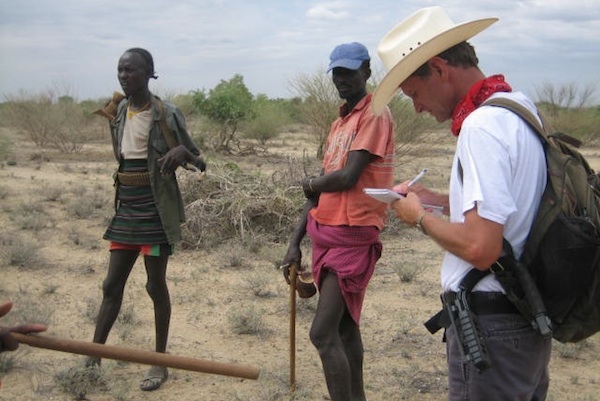Isn't that a wonderful description of the act of walking? Just one foot in front of the other allowing you to really see what's going on…
From NPR:
Copyright ©2013 NPR. For personal, noncommercial use only. See Terms of Use. For other uses, prior permission required.
Back in January, we spoke with journalist Paul Salopek, who then was setting off from Ethiopia on a round-the-globe journey. Salopek is a two-time Pulitzer Prize winner, a foreign correspondent who has traveled the world - but never quite like this. Now a National Geographic fellow, he has plans to cover some 21,000 miles over seven years - and get this, all of it on foot. He has crossed continents now, moving from Africa to Asia; and we reached him in Saudi Arabia. And Paul, thanks for checking in with us.
PAUL SALOPEK: Thanks, David. It's a pleasure to be here.
GREENE: So can you tell me where, exactly, you are, and how you arrived there?
SALOPEK: Yeah. I'm actually in Riyadh, Saudi Arabia, right now; basically, made the crossing from Africa to the Middle East, the Arabian Peninsula, after a - oh, about a 400-mile walk up the Rift Valley of Africa through Ethiopia and Djibouti.
GREENE: It's amazing to hear, you know, oh, a 400-mile walk - as if it's just a casual thing. You crossed the Red Sea in a boat that usually is not ferrying humans but camels - is that right?
SALOPEK: That's correct. I'm retracing the routes of the human diaspora out of Africa. And our ancestors moved across the Bab-el-Mandeb Strait, which translates to the Strait of Grief; between the Horn of Africa and Arabia. So I am taking a boat when it's absolutely necessary. And in this case it was a camel boat. It was a boat carrying 9,000 souls(ph). That would be about 850 camels and 8,000 sheep and 23 human beings.
GREENE: And what was that like?
SALOPEK: It was - David, it was fascinating as a storyteller who writes about global affairs because it was like stepping back off the grid. It was kind of a reassuring reminder that not all the world is kind of globalized. These were small family companies who are, you know, working the margins of the livestock trade in the Red Sea. So it was a 35-year-old Italian-built boat designed to originally carry cars and refitted to basically a floating cow pen. We trailed pieces of straw behind us all the way across the Red Sea. I must say, the Saudi port authorities were a bit wide-eyed. It had been a while, perhaps, since a skinny American in a cowboy debarked from a camel boat (unintelligible).
GREENE: Paul, I read one of your dispatches actually about the piracy in the area of the world that you're in and how it's been really threatening people and also threatening science. Researchers are not able to get a lot of the work done that they're used to. Are these the kinds of stories that you're trying to tell along the way doing some journalism, as it were, even as you're on this amazing trip?
SALOPEK: Absolutely. That is the primary purpose of this long trek, what happens when you move slowly enough through stories so that you see them at a very granular level. You get under the headlines and live with the people whose lives are inhabited by the headlines.
GREENE: Any problems along the way? Any illness or problems with authorities getting in your way?
SALOPEK: No. The first leg of the journey up through Africa is probably the most well-prepared section of my walk. So it went off without too many political glitches or paperwork glitches. It was, however, a crossing of one of the hottest deserts in the world. And I was very fortunate to be walking with the Afar(ph), these camel nomads who live in the area who are masters at survival. So they knew where the water holes were. And what I'm discovering is that the physical rigors of crossing this desert were a huge obstacle to overcome at the end of the day when I would have to break out my laptop and set up the satellite phone and try to write, hopefully, a decent story.
GREENE: The combination that's striking me is being out there in a desert with nomads who are leading you to watering holes even as you're out there setting up your laptop.
SALOPEK: It does get a bit surreal - taking calls from editors around a campfire at night when one of my walking colleagues is, you know, ill with typhoid and trying to get this man to a hospital and doing it on foot.
GREENE: And did that gentleman make it to the hospital and survive?
SALOPEK: H did indeed, yeah. We waited for 10 days at an oasis town for him to get better, and he insisted on rejoining us.
GREENE: Well, tell me, Paul, what's next? Where do you go from here?
SALOPEK: I'll be heading up to one of the big ancient crossroads on the planet in the Middle East. So I'm walking up the Red Sea coast, Saudi Arabia, about seven or eight hundred miles and I'll be walking with Saudi friends who will be also helping me with logistics. In fact, day after tomorrow, we're headed down to Jidda to try to buy two more camels.
GREENE: Well, good luck with that purchase. That's journalist Paul Salopek who is speaking to us by phone from Saudio Arabia. Paul, thanks so much for checking in with us. And honestly, safe travels.
SALOPEK: Thanks so much, David. It's a great pleasure to be talking with you.
http://www.npr.org/2013/05/06/181506742/trip-update-salopek-walks-from-ethiopia-to-saudi-arabia

No comments:
Post a Comment